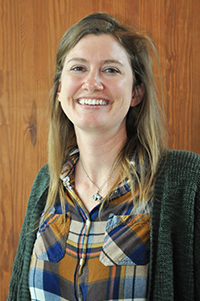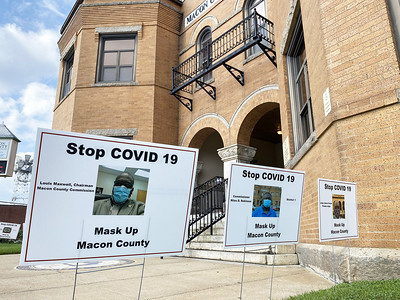An Auburn University researcher is leading a yearlong project that examines the COVID-19 pandemic in low-income, health-vulnerable communities in the three poorest states in the Southeast—Alabama, Louisiana and Mississippi—to examine how decision makers interpret and communicate information to compel collective action during a crisis. The project was authored because Black, Indigenous and other people of color are suffering disproportionate health and socioeconomic impacts of the pandemic.
Kelly Dunning, assistant professor in the School of Forestry and Wildlife Sciences and director of its Conservation Governance Lab, said decision makers in federal, state, tribal and local agencies face a critical knowledge gap when it comes to strategies for communicating scientific recommendations within the nation’s most vulnerable communities.
The National Science Foundation, or NSF, awarded a rapid response research, or RAPID, grant of nearly $150,000 to Dunning and her team. RAPID grants support research that has a severe urgency—in this case, the COVID-19 pandemic—with the goal of mobilizing the scientific community’s understanding of the crises and developing measures to respond to it.
Dunning, a member of the Auburn Zoonotic Disease Working Group and an expert in collective action, science-based decision making and participatory methods, said the team aims to fill the existing knowledge gap by examining how decision makers have responded to COVID-19 in the poorest states in the U.S. and how people living in these consumed, interpreted and acted upon science-based messaging from decision makers.
“Specifically, we will analyze the effectiveness of science-based messages, how influential various sources of the messages were and the perceived trustworthiness of the institutions delivering COVID-19 information in low-income communities, compared to their wealthier counterparts,” she said.
The project’s participatory design will ensure that end users are involved in shaping, implementing and learning from the research throughout its duration, she added.
Along with Dunning, key personnel in the interdisciplinary team are Janna Willoughby, assistant professor in Auburn’s School of Forestry and Wildlife Sciences who has expertise in analysis and management of large datasets, and Parrish Bergquist, assistant professor at Georgetown University and an expert in survey design, public opinion measurement and experimental designs in social science.
The team also includes Ryan Williamson, assistant professor of political science in Auburn’s College of Liberal Arts, who has an interest in state-level politics and public trust in institutions, and Katie Corvey, a new postdoctoral researcher at Auburn with expertise in public health policy and women’s and children’s health.
Sarah Zohdy, associate professor at the School of Forestry and Wildlife who has expertise in zoonotic diseases, is advising the project informally.
The project is based within the Auburn School of Forestry and Wildlife Sciences, home to the One Health graduate program, which frames public health as a complex interaction of people and the environment.
The team’s objectives include structured conversations and listening sessions with at least a dozen decision makers from agencies at all levels; implementing surveys to a large, representative sample of people in these areas to predict the effectiveness of science-based messages, trust in institutions and message sources with regard to demographics, levels of socioeconomic vulnerability and other variables; and interviewing at least 35 decision makers about the challenges they faced in responding to COVID-19 and the scientific messages that convinced them to take particular policymaking actions, such as giving the “stay-at-home” order.
Those first three objectives will result in the submission of two peer-reviewed research papers to top journals by the end of the project; they will also aid in the employment of graduate and undergraduate research assistants.
Next, the team will host a final workshop with decision makers from federal, state, local and tribal jurisdictions to share the findings.
All this will lead to the creation of a web application for decision makers across the country to apply the new data to their communities. Through the app, they will be able to select demographic and socioeconomic factors that represent their communities and then choose from the suggested messaging and media characteristics that will lead to more effective policy decisions.
School of Forestry and Wildlife Sciences Dean Janaki Alavalapati said the benefits of this research cover an extensive range in terms of the current pandemic and future crises that may emerge.
“Dr. Dunning and her team are collecting and processing extensive data that could ultimately transform and elevate the effectiveness of the urgent messages that decision makers send to their communities in times of great crisis, particularly to those living in the most at-risk regions in the country,” Alavalapati said.
The findings will benefit society as a whole by compelling a greater number of people to act faster and more meaningfully to lessen the impacts of crises.
Dunning, who holds a doctorate from the Massachusetts Institute of Technology and has amassed more than 10 years of experience on environmental policy problems all over the world, said the impact of these findings could improve the effectiveness of crisis messaging beyond our nation’s borders.
“Even though our project takes place in the U.S., we hope it can be replicated globally with findings relevant for a wide range of social and environmental hazards,” Dunning said.
(Written by Teri Greene)











